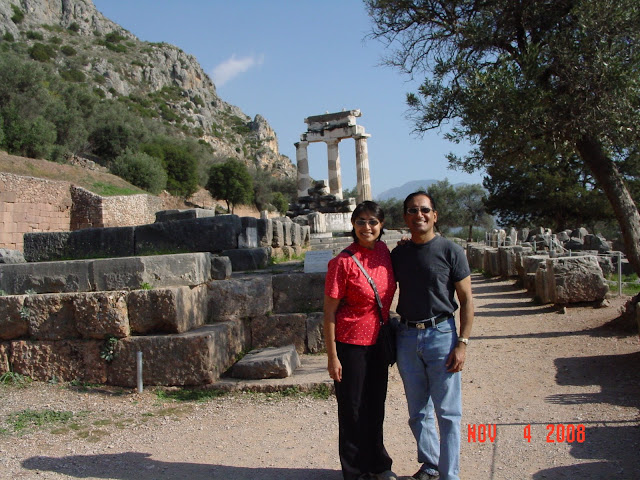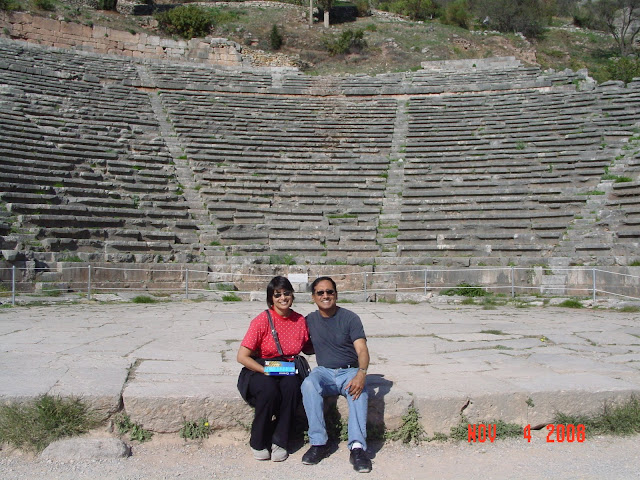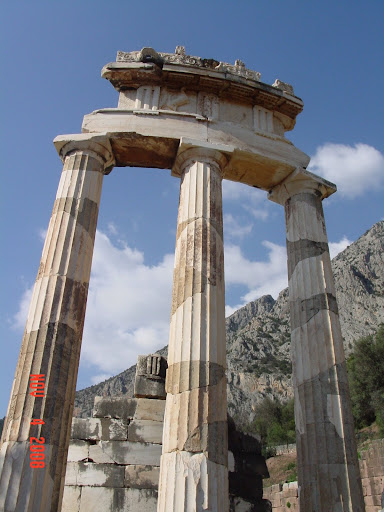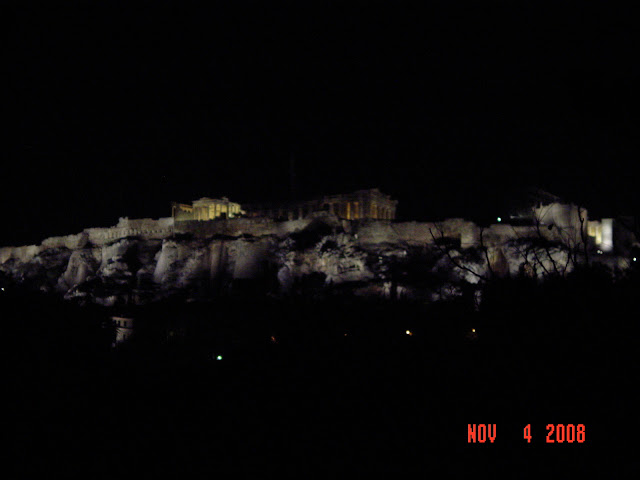Delphi: In Search of the Legendary Oracle
At the Tholos or Rotunda where the Oracle sat making her prophecies at the Sanctuary of Athena
Annalisa Oboe, my Italian professor friend told me that while there wasn’t need to spend too much time in Athens, “Delphi was amazing”. So we asked for a wake up call at the crack of dawn (6.00 am to be exact) and got into our cab at 6.30 am to drive to Athens’ central bus station from where we were told to take a bus to Delphi. Our bus left promptly at 7. 30 am (12. 50 euros for the one way trip) and within an hour, Llew and I were dozing off as the Peloponese swept by outside our window.
We passed by towns with historic names–Thebes and Arahova–quiet, practically deserted. At exactly 10.30 am, we arrived at Delphi, a town whose location is so unique–it is actually perched on a mountain ridge that overlooks the Biblical Gulf of Corinth which lay asleep in the autumn sunshine, the village of Kira spread eagled on its shores. We purchased return tickets on the 4 pm. bus to Athens and without wasting any further time, decided to climb up the hill towards the Archeological site.
The Ancient Archeological Site:
Because my feet were not performing at their best, I had to take the climb very slowly, stopping for frequent breaks as we made our way along the Sacred Road towards the Temple of Apollo. The weather could not have been nicer–gorgeous blue skies draped the green hillside and as we gazed upon Mount Parnassos right opposite, we felt as if we were at the mythical Mount Olympus with the Gods themselves! We had the site almost entirely to ourselves. Occasionally, a group passed us by–serious travelers all, not casual tourists. Equipped with guide books and cameras, they studied each ruined remain, carefully, lovingly, awash in the colorful history of what was once a thriving city.
Along the Sacred Way, the Temple of Apollo (left) is intact, small but containing great “spirit of place”. All around stony mountains towered above us, their sides seemingly hacked out to make the stone blocks that fashioned the temples, the streets, the houses. Everything is “in situ”, just as it was centuries ago and I was repeatedly reminded of the glory of Pompeii, except that instead of reading inscriptions in Latin, I was reading them in Greek here. As we climbed the mountain, ever higher, the ruins gained perspective until we finally reached the amazing Amphitheater where plays by the great Greek tragediens, Eschyles, Sophocles and Euripedes were performed together with the comedic work of Aristophanes. I had to pinch myself because I could not believe that I was right there–in the exact venue where these greatest of dramatic works first made their presence known to the world.
In a superb state of preservation, this amphitheater (left) gave us such a vivid sense of what it must have been like to watch dramatic works while overlooking the majesty of a mountain range.Then, we arrived at the Stadium, also in a fine state of preservation. Though we weren’t allowed to walk upon the field, we did see the starting blocks inscribed with the initials of the athletes who used them. My feet carried me up courageously to this point and I felt almost as stoic as those Greek gods as I dealt with the challenging terrain in my effort to see it all.
The Castillian Spring:
Getting down the mountain was less strenuous, of course, but no less demanding on the tendons of my feet still recovering from recent inflammation. Still, I soldiered on, until we were back on the main road again, heading towards the ancient Castillian Springs whose cool water still flows out of the mouth of a stone lion. Llew bent down to fill our water bottle only to be confronted by a Greek man who took a look at his cap that said “Americares” and pronounced, “Obama, Obama”. Llew gazed at him bewildered, expecting him to be speaking Greek and not making the connection between the American elections that were only a day away. At this point, I turned to the man and said, “Yes, yes, we too would like to see Obama win”. Only then did it dawn upon Llew that he wasn’t speaking Greek at all!
The Sanctuary of Athena:
When we had refreshed ourselves at these ancient waters, we headed towards the Gymnasium where a large basin dominated the scene. This was used as a cooling pool by wrestlers who practiced their feats of strength and endurance in the open mountain air. Just ahead a path led to Delphi’s most significant monument–the Tholos or Rotunda, where the famous Oracle made her ominous predictions at the Sanctuary of Athena.
As we gazed upon the marble columns of the monument (left), now almost entirely in ruin, so many scenes from history and literature passed through my mind. I thought of Socrates who was told by the Delphic Oracle, “Philosopher, Know Thyself”. Upon that one pronouncement is based the entire philosophy of the Socratic Method. Then, there was poor ill-fated Oedipus who was told by the Delphic Oracle that he would kill his father and marry his mother and oh my god, how awful that the prediction came to pass and led to the gouging out of his eyes! And then there was Alexander the Great who sought out the Oracle with the hope of being informed that he would conquer the world–only to receive vague infuriating answers that caused him to drag the Oracle by her hair until she cried, “Stop! You are the most invincible man in the world”. And with that, he let her go, stating “I have just received my answer”. Whew! Talk about egomaniacs!
So Llew and I posed for pictures around the Tholos, still incredulous at the thought that we were in the presence of the ancient world’s most sacred sites, the Sanctuary of Athena, where prophecies were made and brought to pass. When we had our fill of the classical fervor of the site, we set out in search of lunch for my feet were almost killing me by this point. They led me to do something I haven’t done in a long time–hitchhike with Llew remaining out of sight until a kindly motorist stopped to give us a ride back to the village. There, we gratefully sank down into the bent chairs at Taverna Gargadouas where we ordered a Greek Salad and the house specialty, Provotina–Grilled Lamb. Over red wine (a huge glass for fifty cents made no sense at all), we relaxed completely and feasted our eyes upon the scene that lay ahead–Mount Parnassos and the Gulf of Corinth. Llew left me on a wayside wall to rest my feet while he wandered around the village. A few souvenir stores were still open but the lack of activity clearly proclaimed the fact that the tourist season had passed for the year.
Back to Athens:
Back on the bus at 4 pm, we slept soundly for the most part. We had by then made friends with Anya Brug, an art historian from Germany and her boyfriend Andrea, an art historian from Italy, who suggested that we get off at Thissou to catch our first glimpse of the Parthenon illuminated at night. It was a very sensible suggestion indeed. A few minutes later, we were on the Metro (the underground railway network) that took us to the very foot of the Acropolis and allowed us to feast our eyes upon a truly breathtaking sight. We did not linger long, though, much as we wanted to, as I simply did not have the foot stamina to do any more walking.
Instead, we hopped on to the metro again, got off at Monastiraki to enter the old crowded quarter of Plaka that is chock full of souvenir shops, bars, cafes and restaurants. It was at one of these that we enjoyed one of our most memorable meals–medzes (mixed appetizers) at Cafe Konstantin, where we tasted the most delectable preparations–some natural, others cooked only slightly. We savored the most succulent tomatoes and cucumbers, grilled zucchini and green peppers, tzakiki and spanakopita, fresh feta cheese and dolmades (rice stuffed vine leaves), broad beans in a spicy tomato sauce, olives and cheese pie. With a glass of red wine and the simplest of desserts–just Greek yoghurt bathed in thyme honey–we had ourselves a memorable meal. At the end of the evening, with the lights of the Acropolis following us almost back to our doorstep, we entered our hotel past midnight and slept the sleep of the dead, though Llew woke up in the middle of the night to discover that Obama had just taken Pennsylvania. With the near certainty that we’d have a historic Black President in the White House, he turned over and went soundly back to sleep.
To follow us on our travels in Greece, please click on the link for Mykonnos.
Bon Voyage!




